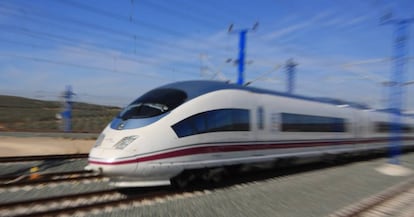Brussels tells Spain to recover high-speed rail funds
European Commission says Málaga test center aid did not help regional development

The EU has ordered Spain to recover €140 million in state aid set aside for a high-speed train test center in Málaga, saying it was unnecessary.
In 2015, the European Commission launched a probe into the plans for the Centro de Ensayos de Alta Tecnología Ferroviaria (CEATF) testing site near Málaga, designed to allow trains to travel as fast as 520 kilometers per hour. The Commission's investigation revealed that in fact Spain already paid out, from 2011, €140 million to ADIF before the Commission's decision, in violation of EU rules.
"There does not appear to be any interest in the market to develop products that run at such high speeds," the commission said in a statement, adding: "In fact, it was expected to generate losses throughout its entire period of operation."
The Commission said the project did not help promote sustainable development in Andalusia
The rail test site was to include tunnels and viaducts to simulate the real-life conditions on high-speed networks. The project was approved by the Spanish government which planned to apply for EU funding to help pay the €358.6 million bill.
Moreover, the Commission said the project did not help promote sustainable development in Andalusia, noting: “It would only have had limited short-term effects by creating temporary jobs in the construction sector during the building of the infrastructure. This would have come at disproportionate high public costs and Spain was not able to show that the benefits of the project would have offset the construction costs and the operating losses.”
Sign up for our newsletter
EL PAÍS English Edition has launched a weekly newsletter. Sign up today to receive a selection of our best stories in your inbox every Saturday morning. For full details about how to subscribe, click here
The Commission's investigation further concluded that the project was not in line with EU state aid rules, “because it does not meet a genuine objective of common interest.”
It added that there was “no interest in the market to develop products that run at such high speeds, because they would not be commercially viable.”
In the absence of demand for such specific services, the use of the CEATF facility would in practice have been limited to testing trains and equipment up to the commercially viable speeds of 320-350 km/h, for which testing centers already exist in the EU. “The CEATF would only duplicate these existing infrastructures,” concluded the Commission.
The verdict is particularly embarrassing for Spain, where a decade-long construction binge sent the economy crashing in 2008.
The worst symbols in that crisis were vast yet pointless public projects with links to political cronyism, including several "ghost airports" that lie virtually deserted.
English version by Nick Lyne.
Tu suscripción se está usando en otro dispositivo
¿Quieres añadir otro usuario a tu suscripción?
Si continúas leyendo en este dispositivo, no se podrá leer en el otro.
FlechaTu suscripción se está usando en otro dispositivo y solo puedes acceder a EL PAÍS desde un dispositivo a la vez.
Si quieres compartir tu cuenta, cambia tu suscripción a la modalidad Premium, así podrás añadir otro usuario. Cada uno accederá con su propia cuenta de email, lo que os permitirá personalizar vuestra experiencia en EL PAÍS.
¿Tienes una suscripción de empresa? Accede aquí para contratar más cuentas.
En el caso de no saber quién está usando tu cuenta, te recomendamos cambiar tu contraseña aquí.
Si decides continuar compartiendo tu cuenta, este mensaje se mostrará en tu dispositivo y en el de la otra persona que está usando tu cuenta de forma indefinida, afectando a tu experiencia de lectura. Puedes consultar aquí los términos y condiciones de la suscripción digital.









































